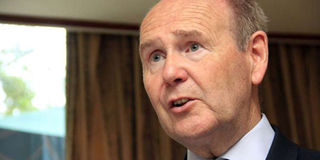We are in Africa to stay, says StanChart

Standard Chartered Plc chairman Sir John Peace during the interview with The Business Daily at the Serena Hotel on April 15, 2016. PHOTO | DIANA NGILA | NATION MEDIA GROUP
What you need to know:
- StanChart’s global chairman Sir John Peace said the multinational is optimistic of Africa’s long-term prospects and is ready to ride out current economic challenges including currency depreciations.
- The African units posted a combined operating income of $1.4 billion (Sh144.6 billion) last year, accounting for nine per cent of the multinational’s aggregate revenues.
- Western banks have paid billions of dollars in fines over the past few years for a number of malpractices including predatory lending, rigging exchange and interest rates and aiding some governments to evade sanctions.
London-based Standard Chartered Plc says it will retain and increase its African business, breaking ranks with its peer Barclays Plc that is pulling out of the continent.
StanChart’s global chairman Sir John Peace said the multinational is optimistic of Africa’s long-term prospects and is ready to ride out current economic challenges including currency depreciations.
“We remain committed to Africa and certainly are looking to invest and grow here,” Sir Peace told Daily Nation in an interview in Nairobi.
Absolutely vital
“We are very much an international bank focused on trade and investment in Asia, Africa and the Middle East. So Africa is an absolutely vital part of our overall network.”
StanChart operates in more than ten countries in Africa including Nigeria, Tanzania, Uganda and Ghana.
The African units posted a combined operating income of $1.4 billion (Sh144.6 billion) last year, accounting for nine per cent of the multinational’s aggregate revenues.
StanChart, however, recorded a loss of $32 million (Sh3.2 billion) from its African operations in the same period in what it attributed to factors such as currency depreciation and increase in bad debts.
Sir Peace said the multinational believes that Africa will be a significant driver of the global economy’s growth in the coming decades.
He added that the current challenges, including depressed economies in countries reliant on commodity exports, have not shaken their outlook.
Unlike StanChart, Barclays says it will “sell down” its 62.3 per cent stake in Barclays Africa –the holding company for its African units including the Kenyan subsidiary— over the next two years.
Barclays said the decision is informed by increased regulatory and capital pressures facing global banks. The multinational also sees extra risks of corruption and misconduct in Africa as challenges.
Western banks have paid billions of dollars in fines over the past few years for a number of malpractices including predatory lending, rigging exchange and interest rates and aiding some governments to evade sanctions.
FINANCIAL CRISIS
Sir Peace said StanChart is responding to the reputational and regulatory risks by investing more in compliance processes.
Banks deemed to be systemically important at the global level are also being asked to boost their liquidity and capital holdings to enable them withstand a financial crisis without needing taxpayer-funded bailouts.
For Barclays, conclusion of the spin-off will see it sell all or part of the 42.6 per cent indirect stake it holds in the Barclays Bank of Kenya which is listed on the Nairobi Securities Exchange.
This means minority investors will get a new partner to replace Barclays and remain on the bourse. However, the lender could de-list from the stock market depending on the preference of the buyer.





